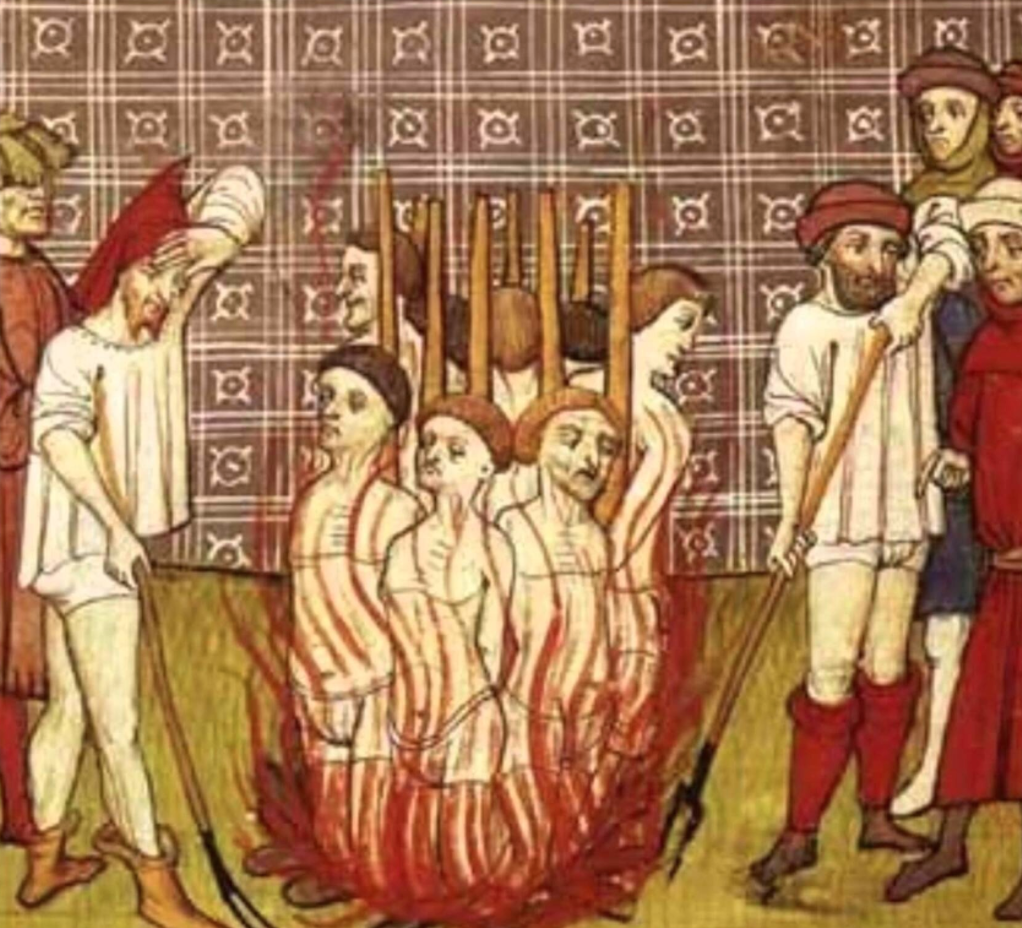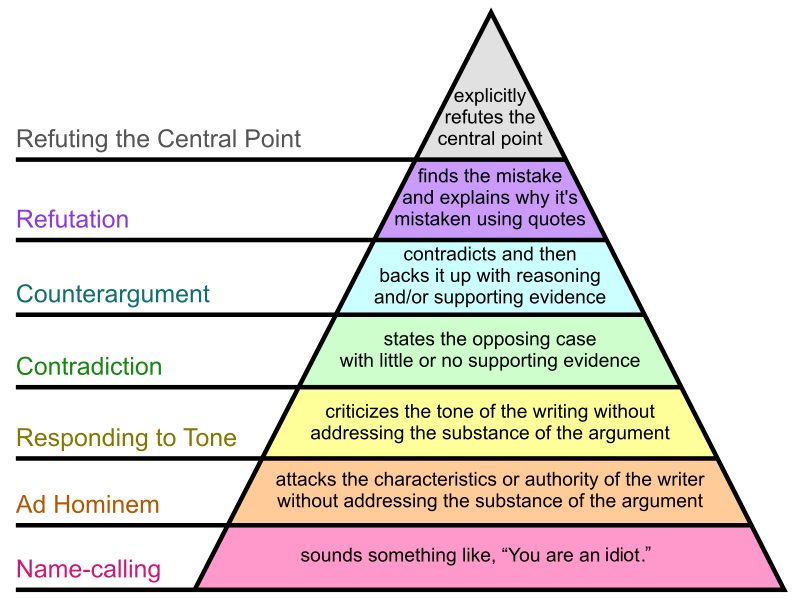Many of the builders of the modern internet are beginning to reflect on the odious direction of the modern culture the internet has spawned. Recently, we saw Jack Dorsey come out and say that he regrets his role in transforming the internet into what it is today. Elon Musk is becoming more vocal. Peter Thiel remains vocal.
Paul Graham is a British programmer and tech industry venture capitalist. Along with writing his own programming language, as a founder of Y Combinator, he provided seed funding for reddit.
He is also an essayist, responsible for the “Hierarchy of Disagreement” pyramid that was widely used by redditors in ye olden days.
Along with reddit, he seed-funded such companies as Dropbox and Airbnb. He’s a very influential figure in terms of technology and capital allocation.
Last week, he published an essay effectively denouncing the entirety of the modern culture, most or all of which is a result of the internet landscape which has been hijacked and redirected from its original purpose by nefarious forces. This shift from such a prominent figure in the tech industry is an omen of the direction that the key players in the founding of the modern internet, who still have the money, are moving in.
In a post called “Heresy,” he writes on his website:
One of the most surprising things I’ve witnessed in my lifetime is the rebirth of the concept of heresy.
In his excellent life of Newton, Richard Westfall writes about the moment when he was elected a fellow of Trinity College:Supported comfortably, Newton was free to devote himself wholly to whatever he chose. To remain on, he had only to avoid the three unforgivable sins: crime, heresy, and marriage.
The first time I read that, in the 1990s, it sounded amusingly medieval. How strange, to have to avoid committing heresy. But when I reread it 20 years later it sounded like a description of contemporary employment.
There are an ever-increasing number of opinions you can be fired for. Those doing the firing don’t use the word “heresy” to describe them, but structurally they’re equivalent. Structurally there are two distinctive things about heresy: (1) that it takes priority over the question of truth or falsity, and (2) that it outweighs everything else the speaker has done.
For example, when someone calls a statement “x-ist,” they’re also implicitly saying that this is the end of the discussion. They do not, having said this, go on to consider whether the statement is true or not. Using such labels is the conversational equivalent of signalling an exception. That’s one of the reasons they’re used: to end a discussion.
If you find yourself talking to someone who uses these labels a lot, it might be worthwhile to ask them explicitly if they believe any babies are being thrown out with the bathwater. Can a statement be x-ist, for whatever value of x, and also true? If the answer is yes, then they’re admitting to banning the truth. That’s obvious enough that I’d guess most would answer no. But if they answer no, it’s easy to show that they’re mistaken, and that in practice such labels are applied to statements regardless of their truth or falsity.
The clearest evidence of this is that whether a statement is considered x-ist often depends on who said it. Truth doesn’t work that way. The same statement can’t be true when one person says it, but x-ist, and therefore false, when another person does.
The other distinctive thing about heresies, compared to ordinary opinions, is that the public expression of them outweighs everything else the speaker has done. In ordinary matters, like knowledge of history, or taste in music, you’re judged by the average of your opinions. A heresy is qualitatively different. It’s like dropping a chunk of uranium onto the scale.
Back in the day (and still, in some places) the punishment for heresy was death. You could have led a life of exemplary goodness, but if you publicly doubted, say, the divinity of Christ, you were going to burn. Nowadays, in civilized countries, heretics only get fired in the metaphorical sense, by losing their jobs. But the structure of the situation is the same: the heresy outweighs everything else. You could have spent the last ten years saving children’s lives, but if you express certain opinions, you’re automatically fired.
It’s much the same as if you committed a crime. No matter how virtuously you’ve lived, if you commit a crime, you must still suffer the penalty of the law. Having lived a previously blameless life might mitigate the punishment, but it doesn’t affect whether you’re guilty or not.
A heresy is an opinion whose expression is treated like a crime — one that makes some people feel not merely that you’re mistaken, but that you should be punished. Indeed, their desire to see you punished is often stronger than it would be if you’d committed an actual crime. There are many on the far left who believe strongly in the reintegration of felons (as I do myself), and yet seem to feel that anyone guilty of certain heresies should never work again.
There are always some heresies — some opinions you’d be punished for expressing. But there are a lot more now than there were a few decades ago, and even those who are happy about this would have to agree that it’s so.
Why? Why has this antiquated-sounding religious concept come back in a secular form? And why now?
You need two ingredients for a wave of intolerance: intolerant people, and an ideology to guide them. The intolerant people are always there. They exist in every sufficiently large society. That’s why waves of intolerance can arise so suddenly; all they need is something to set them off.
I’ve already written an essay describing the aggressively conventional-minded. The short version is that people can be classified in two dimensions according to (1) how independent- or conventional-minded they are, and (2) how aggressive they are about it. The aggressively conventional-minded are the enforcers of orthodoxy.
Normally they’re only locally visible. They’re the grumpy, censorious people in a group — the ones who are always first to complain when something violates the current rules of propriety. But occasionally, like a vector field whose elements become aligned, a large number of aggressively conventional-minded people unite behind some ideology all at once. Then they become much more of a problem, because a mob dynamic takes over, where the enthusiasm of each participant is increased by the enthusiasm of the others.
It’s very encouraging to see someone so influential communicating these ideas in such a direct (although polite) way.
We may be at the beginning of a shift. People with money and power who are not directly connected to the weirdo pervert technocratic establishment are finally beginning to see that we have created a world that will not be suitable for anyone’s children, and that we need to not only hit the brakes on the cultural transformation, but shift to reverse.
Everything is a culture war. Obviously, it’s well understood that economics is the backbone of any society, but the direction of any society is driven by culture. Everything that is happening, the world over, can be framed in terms of this culture war.
The lines of the war are very simple: it is the heretic-hunters that Graham identifies versus everyone else. I’m certain I don’t agree with everything Graham believes, but we are now nonetheless on the same side in that we oppose the enforcement of a strict social and cultural orthodoxy, which crushes human freedom.
"Are you ready for the New World Order?" asks Global Government Summit 2022. pic.twitter.com/1pwnDjy7BW
— Aytan Gahramanova (@AytanGahramano1) April 5, 2022
Just so, one might not agree with everything going on in Russia, China, or India, but they are nonetheless standing in opposition to this emerging global uniculture, which demands absolute adherence to a very strict set of rules regarding the norms of social interactions.
These norms being enforced all lead in the single direction of the establishment of a new global order which an unimpeachable financial and political elite sits atop, by a kind of divine right of moral virtue – adherence to a cultural system they themselves created for the purpose of the suppression of free thought and free behavior. This allows them to do literally anything they want by invoking heresies and stirring up moral panic, as an army of true believers will march against anyone who dares question their orthodoxy.
⭕️ Herr Schwab at the World Government Summit 2022:
“Ve do know zee global energy systems, zee food systems, and supply chains will be deeply affected.”
He knows because he helped plan the disruption to the supply chains.
It’s called ‘#BuildBackBetter’ pic.twitter.com/RvSWzRV9Aa
— 21st Century Wire 🇵🇸 (@21stCenturyWire) April 10, 2022
What they have done is hacked the moral fabric of the human psyche, replacing the in-born drive toward a religious social consensus with a secular pseudo-religious doctrine that exists in a vacuum and can therefore be reshaped and redirected at will by those who control the media and governments of the West.
This has all been obvious for quite a while, but people who were in denial about it, or were simply not paying close enough attention, are reaching the point where they realize they need to pick sides. For my part, I will align with anyone who is against the dominant Western authoritarian secular morality system, regardless of any other disagreements I may have with them.



